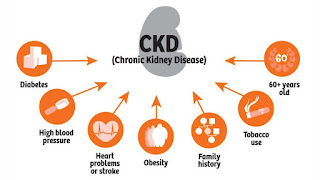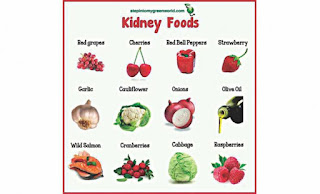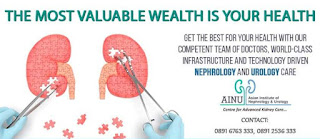Best treatment for chronic kidney disease their symptoms and diet plan
What is chronic kidney disease?
Chronic kidney disease means the kidneys have been
damaged by conditions, such as diabetes, high blood
pressure or glomerulonephritis. As a result, the kidneys
are less able to do the following jobs to help maintain
health:
- Remove wastes and extra fluid from your body
- Release hormones that help to:
- Control blood pressure
- Promote strong bones
- Prevent anemia by increasing the number of red blood cells in your body
How are high blood pressure and kidney disease related?
They are related in two ways:
- High blood pressure is a leading cause of CKD. Over time, high blood pressure can damage blood vessels throughout your body. This can reduce the blood supply to important organs like the kidneys. High blood pressure also damages the tiny filtering units in your kidneys. As a result, the kidneys may stop removing wastes and extra fluid from your blood. The extra fluid in your blood vessels may build up and raise blood pressure even more.
- High blood pressure can also be a complication of CKD. Your kidneys play a key role in keeping your blood pressure in a healthy range. Diseased kidneys are less able to help regulate blood pressure. As a result, blood pressure increases.
How do I know if my blood pressure is too high?
- The only way to tell if your blood pressure is too high is to have it measured. High blood pressure usually causes no symptoms. That is why it has been called a “silent killer.” A single high reading may not mean you have high blood pressure. It should be confirmed on follow-up visits to your doctor or clinic. Blood pressure is measured as two numbers. The top number, or systolic blood pressure, is the pressure when your heart is beating. The bottom number, or diastolic blood pressure, is the pressure when your heart is resting between beats. A blood pressure reading of 130/80 is read as 130 over 80
I have high blood pressure but am not sure if I have CKD. What should I do?
Everyone who has high blood pressure has an
increased chance of developing CKD. You should ask
your doctor about having the following tests:
- A blood test for creatinine, a waste product from muscle breakdown. This should be used to calculate your glomerular filtration rate, or GFR. Your GFR is a measure of your level of kidney function. If your GFR is too low, it may mean your kidneys are not able to remove enough wastes and extra fluid from your blood.
- A urine test for protein. Persistent protein in the urine is a sign of kidney damage. A higher urine protein means there is an increased chance your kidney disease may get worse and you may develop heart disease.
What tests will I need if I have CKD?
In addition to checking your GFR and urine protein,
you should have the following:
- Diagnosis of the type of CKD you have. This may include an ultrasound to get a picture of your kidneys to check for any problems in size or structure or any blockages.
- Some tests to find out if you have an increased chance of developing heart and blood vessel disease, or if you already have heart problems. These tests will most likely include:
- An electrocardiogram (EKG)
- A blood test for glucose (sugar)
- A blood test for lipids (fatty substances in your blood, such as cholesterol)
- Height and weight measurement to find your body mass index (BMI). This tells if you are overweight.
Your doctor will also talk to you about:
- Any side effects or complications from your medications
- Any problems you may have in following your treatment plan.
How often will I need to visit my doctor or clinic?
Once you are stable with your treatment, you may
not need to visit your doctor or clinic as regularly. Your
doctor will want to see you more often if:
- You start a new medication
- The dose of your medication is changed
- Your kidney disease is getting worse
- Your blood pressure is not controlled.
At follow-up visits, your doctor will check:
- Your blood pressure
- Your GFR n Your urine protein level
- Your blood level of potassium
What will my treatment for high bloodpressure and CKD include?
A treatment plan should be developed especially
for you based on your stage of CKD. In some cases,
your doctor may recommend that you see another
doctor with special training in kidney disease
or high blood pressure. This doctor will help to
develop your treatment plan. The goals of your
treatment are:
- To lower your blood pressure to less than 130/80
- To keep kidney disease from getting worse
- To lower your chance of getting heart disease.
What kinds of changes will I need to make to my diet?
That will depend on your stage of CKD. In stages
1–2, your doctor may recommend that you follow
a diet that is high in fruits, vegetables and dairy
foods, such as the DASH (Diet Approaches to Stop
Hypertension). This diet is low in sugar and sodium.
If you have any questions about your diet, speak
to your doctor. Your doctor can refer you to a
registered dietitian who will help you work out a
diet plan to meet your needs.
People with CKD in
stages 1–4 may also
be asked to make the
following changes:
- Cut back on sodium (found in large amounts in table salt and foods with added salt). You should not have more than 2,400 milligrams of sodium each day
- Cut down on foods that are high in saturated fats and cholesterol. These can clog up your arteries and increase your risk for heart and blood vessel disease.
If you have CKD in stages 3–4, you may be asked to
make some additional changes to keep CKD from
getting worse and to prevent complications such as
bone disease. You may need to:
- Control the amount of protein you eat. Ask your doctor how much protein you need each day. Your dietitian can help you plan your meals to get the right amount of protein to meet your needs.
- Eat fewer foods that are high in phosphorus. High levels of phosphorus in your blood may lead to bone disease. Phosphorus is found in large amounts in dairy products like milk, cheese, pudding, yogurt and ice cream; in nuts and peanut butter; and in beverages like cocoa, beer and dark cola drinks.
world class health care experts are here to help you
from all kidney failure problems for both men and women of all ages and The best urology hospital AINU offer sophisticated care with the passion to serve
the people in need, by setting benchmarks for care using the latest possible
techniques.
World call experts are here Book
an appointment





Comments
Post a Comment